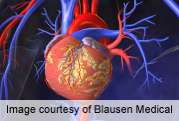Smoking cessation ups survival for patients undergoing PCI

(HealthDay)—Smoking cessation is associated with improved survival for patients who undergo percutaneous coronary intervention (PCI), according to a study published in the Nov. 1 issue of The Journal of Cardiology.
Sanneke P.M. de Boer, M.D., from the Erasmus Medical Center in Rotterdam, Netherlands, and colleagues describe the impact of smoking cessation in terms of prolonged life-years gained in a cohort of 856 patients who underwent PCI in 1980 to 1985. Smoking status at one year was available for 806 patients, and 27 patients who died within one year were excluded from analysis. Patients were followed for 30 years, with a median follow-up of 19.5 years.
The researchers found that the cumulative 30-year survival rate was significantly higher for patients who quit smoking versus persistent smokers (29 versus 14 percent; P = 0.005). Smoking cessation remained an independent predictor of lesser mortality after adjustment for baseline characteristics at the time of PCI (adjusted hazard ratio, 0.57; 95 percent confidence interval, 0.46 to 0.71). The estimated life expectancy was significantly increased for those who quit smoking versus persistent smokers (18.5 versus 16.4 years; P < 0.0001).
"In conclusion, in patients with coronary heart disease who underwent PCI in the late 1980s, smoking cessation resulted in at least 2.1 life-years gained," the authors write.
More information:
Abstract
Full Text (subscription or payment may be required)
Copyright © 2013 HealthDay. All rights reserved.

















